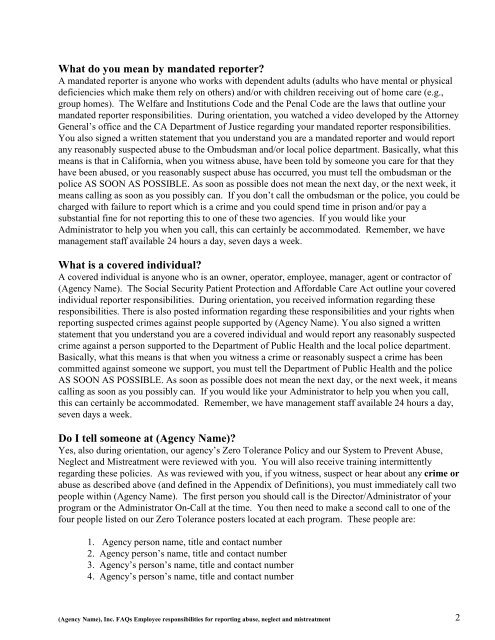ZERO TOLERANCE POLICY
ZERO TOLERANCE POLICY - Regional Center of Orange County
ZERO TOLERANCE POLICY - Regional Center of Orange County
- No tags were found...
You also want an ePaper? Increase the reach of your titles
YUMPU automatically turns print PDFs into web optimized ePapers that Google loves.
What do you mean by mandated reporter?<br />
A mandated reporter is anyone who works with dependent adults (adults who have mental or physical<br />
deficiencies which make them rely on others) and/or with children receiving out of home care (e.g.,<br />
group homes). The Welfare and Institutions Code and the Penal Code are the laws that outline your<br />
mandated reporter responsibilities. During orientation, you watched a video developed by the Attorney<br />
General’s office and the CA Department of Justice regarding your mandated reporter responsibilities.<br />
You also signed a written statement that you understand you are a mandated reporter and would report<br />
any reasonably suspected abuse to the Ombudsman and/or local police department. Basically, what this<br />
means is that in California, when you witness abuse, have been told by someone you care for that they<br />
have been abused, or you reasonably suspect abuse has occurred, you must tell the ombudsman or the<br />
police AS SOON AS POSSIBLE. As soon as possible does not mean the next day, or the next week, it<br />
means calling as soon as you possibly can. If you don’t call the ombudsman or the police, you could be<br />
charged with failure to report which is a crime and you could spend time in prison and/or pay a<br />
substantial fine for not reporting this to one of these two agencies. If you would like your<br />
Administrator to help you when you call, this can certainly be accommodated. Remember, we have<br />
management staff available 24 hours a day, seven days a week.<br />
What is a covered individual?<br />
A covered individual is anyone who is an owner, operator, employee, manager, agent or contractor of<br />
(Agency Name). The Social Security Patient Protection and Affordable Care Act outline your covered<br />
individual reporter responsibilities. During orientation, you received information regarding these<br />
responsibilities. There is also posted information regarding these responsibilities and your rights when<br />
reporting suspected crimes against people supported by (Agency Name). You also signed a written<br />
statement that you understand you are a covered individual and would report any reasonably suspected<br />
crime against a person supported to the Department of Public Health and the local police department.<br />
Basically, what this means is that when you witness a crime or reasonably suspect a crime has been<br />
committed against someone we support, you must tell the Department of Public Health and the police<br />
AS SOON AS POSSIBLE. As soon as possible does not mean the next day, or the next week, it means<br />
calling as soon as you possibly can. If you would like your Administrator to help you when you call,<br />
this can certainly be accommodated. Remember, we have management staff available 24 hours a day,<br />
seven days a week.<br />
Do I tell someone at (Agency Name)?<br />
Yes, also during orientation, our agency’s Zero Tolerance Policy and our System to Prevent Abuse,<br />
Neglect and Mistreatment were reviewed with you. You will also receive training intermittently<br />
regarding these policies. As was reviewed with you, if you witness, suspect or hear about any crime or<br />
abuse as described above (and defined in the Appendix of Definitions), you must immediately call two<br />
people within (Agency Name). The first person you should call is the Director/Administrator of your<br />
program or the Administrator On-Call at the time. You then need to make a second call to one of the<br />
four people listed on our Zero Tolerance posters located at each program. These people are:<br />
1. Agency person name, title and contact number<br />
2. Agency person’s name, title and contact number<br />
3. Agency’s person’s name, title and contact number<br />
4. Agency’s person’s name, title and contact number<br />
(Agency Name), Inc. FAQs Employee responsibilities for reporting abuse, neglect and mistreatment 2



